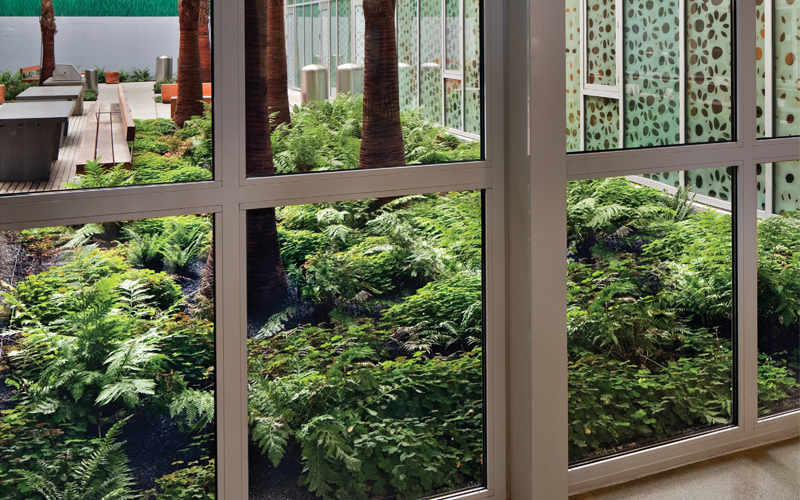Professional Practice
Improving Water Efficiency: Residential Rain Gardens
 The entry lobby overlooks a fern rain garden. ASLA 2012 Professional Residential Design Honor Award. Drs. Julian and Raye Richardson Apartments, San Francisco, California / Andrea Cochran Landscape Architecture
The entry lobby overlooks a fern rain garden. ASLA 2012 Professional Residential Design Honor Award. Drs. Julian and Raye Richardson Apartments, San Francisco, California / Andrea Cochran Landscape Architecture Rain gardens are a depressed vegetated area that use rainfall and stormwater runoff as irrigation. Rain gardens capture and hold water, usually through the use of native plants. By using highly-porous plant materials, rainfall and stormwater runoff can drain more effectively. Rain gardens allow approximately 30 percent of runoff to be filtered into the ground. A properly-designed rain garden can filter one inch of rainfall in four hours.
Instead of extending conventional water infrastructure at great cost, rain gardens can be used to collect rainwater, store it at the residential level, and reduce residential stormwater runoff. Like bioswales or bioretention ponds, the main role of rain gardens is to reduce water flow and limit water volume. Rain gardens also filter stormwater pollution, around 90 percent of copper, lead and zinc; 50 percent of nitrogen; and 65 percent of phosphorus, which could otherwise flow into storm drains and eventually bodies of water.
Homeowner can maximize the effectiveness of rain gardens by improving the quality of soil on their property. Green infrastructure and stormwater management systems are essentially useless if the soil has been degraded and compacted, reducing the flow of water and air, and restricting root establishment. The Sustainable Sites Initiative™ (SITES®) provides credit for using innovative soil remediation techniques, like subsoiling and adding soil amendments, to improve the ecosystem function of their soil.
Sources: Rain gardens fact sheet, Rutgers University; American Rivers
Organizations
Bluegrass Rain Garden Alliance
Rain Garden Initiative
National Gardens Club
Central Ohio Rain Garden Initiative
Toledo-Lucas County Rain Garden Initiative
Rain Garden Network
Research
"The Rain Garden Planner: Seven Steps to Conserving and Making Water in the Garden," Terry Wallace, Schiffer Publishing, 2008
“Rain Gardens: Sustainable Landscaping for a Beautiful Yard and a Healthy World,” Lynn M. Steiner & Robert W. Domm, Voyageur Press, 2012
How-to Guides
Rain Garden Templates for Maryland, Low Impact Development Center
Rain Garden Manual for Homeowners, Erie County Conservation District
Rain Gardens: A how-to manual for homeowners, University of Wisconsin Extension
Rain Gardens Technical Guide: A landscape tool to improve water quality, Virginia Department of Forestry
Resources
Rain Gardens, Water Resources Program, Rutgers New Jersey Agricultural Experiment Station
Water Resource Program – Rain Gardens, Rutgers University
Soil Texture Fact Sheet, Cornell University Cooperative Extension
Rain Gardens: A Way to Improve Water Quality, UMass Amherst, The Center for Agriculture, Food and the Environment
Government Resources
Build a Rain Garden, City of Gresham, Oregon
Rain Gardens, County of Washtenaw, Michigan
Rain Garden Grants Program, Burnsville, Minnesota
RainWise Rebate Program, City of Seattle & King County, Washington
RainWise Access Grant, City of Seattle & King County, Washington
Yard Smart Rain Rewards, City of Kirkland, Washington
Rain Garden Rebate Program, City of Everett, Washington
Catching Rain Fort Wayne Incentive Program, City of Fort Wayne, Indiana
Projects
Private Residential Garden, Minneapolis, Minnesota
Oslund.and.assoc., Minneapolis, Minnesota
Drs. Julian and Raye Richardson Apartments, San Francisco
Andrea Cochran Landscape Architecture
Maple Hill Residence, Westwood Massachusetts
Stephen Stimson Associates Landscape Architects
Woodland Rain Gardens, Caddo Parish, Louisiana
Jeffrey Carbo Landscape Architects
Bud Clark Commons, Portland, Oregon
Mayer/Reed